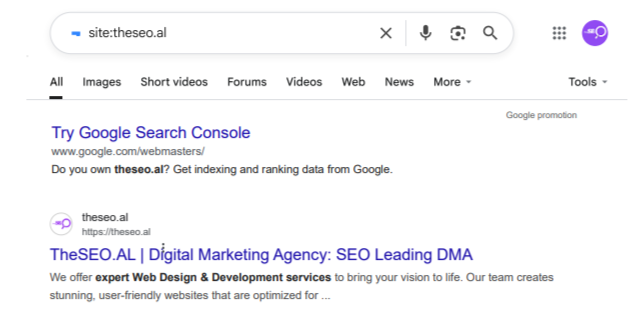What is SEO and How Does it Work?
SEO stands for ‘Search Engine Optimization’, which is the process of getting traffic from free, organic, editorial, or natural search results in search engines. It aims to improve your website’s position in search results pages (SERPs).
TheSEO.al
8/6/20255 min read


Understanding SEO: A Comprehensive Overview
Search Engine Optimization (SEO) refers to the process of enhancing a website's visibility on search engines such as Google, Bing, and Yahoo. The primary objective of SEO is to increase organic traffic to a website by ensuring that it ranks higher in search engine results pages (SERPs). By optimizing a site’s content and structure, businesses can attract more visitors and potential customers, ultimately leading to higher conversion rates and revenue.
In the realm of digital marketing, the importance of SEO cannot be overstated. With millions of websites vying for user attention, standing out in search results is crucial. Effective SEO practices help businesses not only to improve their visibility but also to establish trust and credibility with their audience. Users tend to connect higher rankings with quality and relevance, making SEO a vital element of any successful online strategy.
To grasp the essentials of SEO, it is crucial to understand several key terms. Organic search refers to the unpaid listings that result from search engines' algorithms, which assess the relevance and quality of webpages in response to user queries. Search engine algorithms are complex sets of rules that determine how websites are ranked based on various factors such as keywords, site structure, backlinks, and user engagement.
Furthermore, the role of SEO extends beyond merely increasing website traffic. It significantly enhances user experience by ensuring that the information presented is relevant and accessible. A well-optimized website is designed to meet the needs of its audience, providing valuable content and seamless navigation. As a result, effective SEO strategies lead to improved user satisfaction and retention, paving the way for long-term success in the digital landscape.
The Core Components of SEO
SEO, or Search Engine Optimization, is a multifaceted discipline comprising various essential components that work synergistically to enhance a website’s visibility on search engine results pages (SERPs). Understanding these core components is vital for any website owner or digital marketer aiming to optimize their online presence.
On-page SEO refers to the practices implemented directly within the website’s content and structure to improve its ranking in search results. A crucial aspect of on-page optimization is keyword optimization, which involves the strategic use of relevant keywords throughout the content to align with search intent. This includes incorporating keywords into headings, subheadings, and throughout paragraphs while maintaining a natural flow. Other factors include the use of meta tags, such as title tags and meta descriptions, which provide essential information to search engines and entice users to click through to the website. Additionally, content quality is paramount; well-researched, engaging, and original content not only attracts users but also establishes credibility, thereby contributing to improved search rankings.
Off-page SEO focuses on the factors that occur outside the website but impact its authority and ranking. This primarily includes backlinks, which are links from other websites pointing to your own. High-quality backlinks signal to search engines that the content is valuable and trustworthy. Furthermore, social media signals, such as shares and mentions, play a supplementary role in enhancing a site’s reputation, leading to increased organic traffic.
Technical SEO is another crucial element that addresses the backend structure of a website. Key factors include website architecture, ensuring a logical structure that facilitates easy navigation; mobile optimization, which is vital given the growing number of mobile users; and page speed, as faster-loading pages offer a better user experience and are favored by search engines. Each of these components contributes significantly to a site's overall performance in search results.
How Search Engines Work: The Behind-the-Scenes Mechanism
Search engines serve as vital tools that facilitate users' access to the vast resources available on the internet. Their operation is complex and involves multiple stages, primarily characterized by crawling, indexing, and ranking web pages. Initially, search engines deploy automated programs known as crawlers or spiders to explore the internet. These crawlers navigate from one page to another through links, systematically gathering information about each webpage encountered.
Following this crawling process, the next critical stage is indexing. During indexing, the gathered data is processed and stored in a massive database, allowing the search engine to categorize and retrieve relevant content swiftly when users perform searches. The way search engines organize this data is influenced by various factors, including keywords, content quality, and the overall structure of the websites visited. A well-indexed website is far more likely to surface in search results, making indexing a foundational aspect of search engine optimization (SEO).
Ranking is the final step in this intricate process. Once a user initiates a search, the search engine employs sophisticated algorithms to evaluate and rank the indexed pages based on their relevance and quality. These algorithms consider numerous factors, such as the presence of keywords, page load speed, mobile-friendliness, and user engagement metrics, to determine the best results to display. Different search engines, like Google, Bing, and Yahoo, utilize unique algorithms, leading to variations in the search results presented to users. For instance, Google is well-known for its emphasis on user experience and content relevance, whereas Bing may prioritize different metrics. Therefore, understanding how these elements function together provides valuable insight into the overarching mechanism of search engines, ultimately enhancing the effectiveness of SEO strategies.
Implementing Effective SEO Strategies for Your Business
Implementing effective SEO strategies is crucial for businesses seeking to enhance their online visibility and attract organic traffic. One of the foundational aspects of SEO is conducting thorough keyword research. This process involves identifying the terms and phrases that potential customers use when searching for products or services similar to yours. Tools such as Google Keyword Planner, SEMrush, or Ahrefs can assist in finding relevant keywords and assessing their search volume and competition. By targeting the right keywords, businesses can create content that resonates with their audience.
Creating high-quality, engaging content is another pivotal element of a successful SEO strategy. Content should not only incorporate target keywords naturally but also provide value and answer users' queries. Blog posts, articles, videos, and infographics can all serve as effective formats to deliver information. Additionally, updating existing content to keep it fresh and relevant can also improve search rankings.
The structure of your website plays a significant role in optimizing SEO. A well-structured website allows search engines to crawl and index pages effectively. Utilizing clear categories, proper URL structures, and internal links can enhance navigation and user experience. Furthermore, optimizing page load speed, mobile responsiveness, and incorporating alt text for images are vital to meeting both user and search engine expectations.
Analyzing SEO performance is crucial for measuring the success of implemented strategies. Utilizing tools like Google Analytics and Google Search Console can provide insights into site traffic, user behavior, and keyword performance. This data helps in refining strategies and addressing any ineffective practices.
Common mistakes that businesses should avoid include neglecting local SEO, failing to optimize for mobile, and overlooking the importance of quality backlinks. Moreover, to remain competitive, it’s essential to stay updated with industry trends and algorithm changes. Resources like Moz, Search Engine Journal, and SEO blogs can provide valuable information on these topics.
Lastly, leveraging SEO management tools, such as Yoast SEO for WordPress or Moz Pro, can streamline the optimization process. With the right approach, businesses can harness the power of SEO to achieve their marketing goals effectively.
Leading the way in digital marketing solutions for businesses.
Stay in the loop
info@theseo.al
+355 69 6971 642
© 2025 TheSEO.al . All rights reserved.






